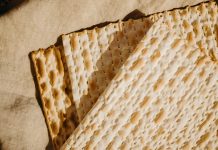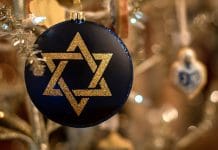I am not close with members of my family of origin, nor do I live near any of its members. Since my husband is not Jewish, any efforts to raise our four-year-old daughter with a sense of her Jewish maternal heritage rest, naturally, with me. Given some recent difficulties with family members, I have had to take stock and ask myself how much time and effort I am interested in devoting to exposing my daughter to Judaism. I wasn’t sure I wanted to do much at all anymore until a couple of recent experiences pointed the way.
The first was a tot Shabbat held at the synagogue that houses my daughter’s preschool. I wasn’t planning on going, but one of the other moms of a child in my daughter’s class let me know how happy she would be if Willow and I were to attend. Her husband was away and she didn’t think she would know anyone else at the event but really wanted to take her daughter. We had been meaning to arrange some out-of-school playdates for the girls anyway, I had no plans that evening, my husband was also out of town, and I welcomed the opportunity to spend more time with this woman and her daughter. So I agreed to go. The whole Shabbat thing, in my mind, was secondary. This was about socializing.
So we went. We brought along some food to share at the potluck supper before the service and my friend, our two daughters and I ate together with a very nice family we had not met before. Our girls were, indeed, happy to see each other in a context outside of school, which had not been going that well for either child so far that year. And the food everybody brought was delicious. There was wine, a glass of which, as a cap to a long week as a solo parent, I quite enjoyed. And my daughter ate more roast chicken then I had ever seen her eat. What parent would not enjoy that?
But the real enjoyment of the evening, much to my surprise, came later, during the Shabbat service in the sanctuary. The service was led that evening by a group of Hebrew school preteens. They sang a bunch of harmonic, spirited tunes (including my favorite, a song asking for peace among us and whose chorus is sung both in Hebrew and Arabic) and all of the kids seemed genuinely happy to guide the short, tot-friendly service. Their enthusiasm was infectious, their parents’ pride palpable. The rabbi had given out special photocopied song guides and my daughter, all of four, wanted one for herself so that she could follow along. And she sang! She sang every song, whether she knew it or not, following along to the best of her ability in the songbook, flipping her page when she saw me flip mine. And it made me feel happy and proud. I found myself marveling about how this small thing, this small voice beside me mouthing words she likely did not know the meaning of, helped me feel linked to a whole history of Jews across generations, those related to me and those not. And I marveled, too, that my daughter, at this very moment, felt included in that whole history, even though she was born in China, nowhere close to the Eastern Europe of my ancestors either in geography or genetics.
The richness of the evening continued. The rabbi did something I had never seen before. Rather than have the Torah up on the bimah, the stage, turned away from those of us in the congregation and toward the honored guest who would read from it, instead declared that the Torah would come down to the congregants’ level and be turned around so that its words would face us. In this way, all of the children could stand behind the reader and see the sacred text within the wooden scrolls. My daughter and her friend eagerly ran up to glimpse what these letters and words inside the unusual object looked like. They were close enough to it that they could breath on it. I had been in my forties before I was that close to a Torah, before I could see with my own eyes the hand-inked script that my daughter was taking in at four.
Later, the rabbi invited all of the congregants with birthdays that month to come up to the stage for a special blessing and, as luck would have it, my daughter’s birthday was just a week away. And she had been dying to go up on a stage, any stage, she had been informing me incessantly for weeks. On the stage, she received her special blessing and soon the service ended, but not before Willow and her friend had an opportunity to run around and dance together, holding hands and squealing. It was one of the best synagogue experiences I had ever had. There was nothing precious or sanctimonious about it. It was a living, breathing celebration of youth, tradition and prayers for peace, an evening full of food and wine and appreciation of generations past, present and future. It made me proud and happy not only to be a Jew, but that my daughter, if she continues to have more such positive experiences, might choose to be one too.
A second set of positive experiences occurred during the daily lighting of the Chanukah candles in early December. During this time of year, my husband is usually still at his desk working at sundown, so my daughter and I would light the candles together, just the two of us, every night for eight nights and together we would sing the candle-lighting prayers. Every night Willow and I conducted this little ritual together and every night her memory of the Hebrew prayers and her ability to articulate them with me grew stronger. Willow would light the candles of the little menorah she had made at preschool (with some safety procedures and plenty of supervision in place) while I lit the candles of the menorah my husband and I had received as a wedding gift a decade ago from one of my sisters, which stood just behind Willow’s smaller one. On one or two nights my husband broke away from his desk and joined us, and that was nice, but what I enjoyed more was the private ritual that my daughter and I were sharing in front of the candles together, a ritual that Jewish mothers and daughters have shared for centuries.
So in spite of feeling somewhat estranged from my family of origin, I have to recognize that I do not feel estranged from a greater community of Jews, dead and alive, historic and those who, like me, are still growing into an understanding of themselves as Jews: day to day, Shabbat to Shabbat, holiday to holiday. What we make of our heritage is a lifelong learning. Every day I feel like I am still at the start of it, a beginner, only a hair’s breath farther along the journey than my Chinese daughter, who, at four, walks with me in lockstep as we both learn who and what we are.


































